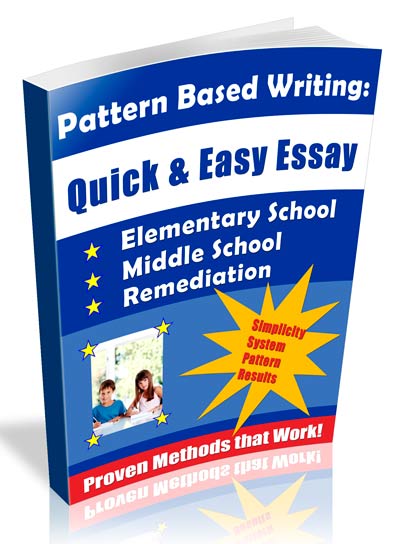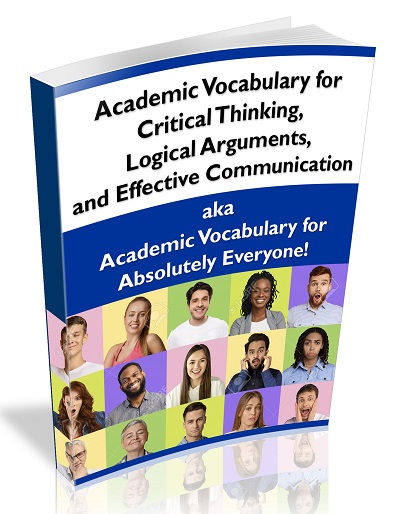Should you teach thesis statements? If so, in what grade should you teach thesis statements? Hey, are thesis statements even important?
Most people don’t really understand what a thesis statement is, and even the people who do understand what a thesis statement is don’t really understand why it is important. Until a few years ago, I didn’t really get them. I didn’t think they were important. I always thought a thesis statement was just a word that English majors liked to use.
When getting my teaching credential I did get straight A’s, and I can honestly say that I never once thought about the term thesis statement. When getting my undergraduate degree, getting good grades was just one of my many interests, so I am quite sure that I cared even less about thesis statements back then. Don’t worry—I did just fine. So, how important are thesis statements if all of this is possible? Do thesis statements really help create good writing? Are thesis statements really an essential element of good writing?
Do We Really Need to Teach Thesis Statements in Elementary School and Middle School?
The California State Writing Standards for 5th grade states this:
Grade 5 Writing Strategies 1.0 – Students write clear, coherent, and focused essays.
Technically, and by definition, an essay has a thesis statement. Okay, so thesis statements may be important. However, when elementary and middle school students are struggling with paragraphs and grammar, thesis statements can SEEM quite unimportant.
In fact, when one considers Piaget’s constructivist learning theory, thesis statements can seem like a waste of time for students who still struggle with a variety of simple writing concepts. Do you want to spend valuable class time teaching students concepts that may not help them just yet? And surely you don’t want students to become so overwhelmed with writing that they think, “Okay, I admit it—I don’t understand writing… and I never will.” Thesis statements can have that effect. So should you or shouldn’t you teach them?
THESIS THINKING: The Real Reason Thesis Statements are Important
What I have now come to see is that you can use thesis statements as a tool for achieving many different writing and reading comprehension results.
Thesis statements have become a coat rack on which I hang many concepts. I’ve come to the conclusion that the most important thing about thesis statements is the THESIS THINKING that goes along with them.
John Truby, a screenwriting teacher, had this to say about story premises. The way he uses the term premise is what I have learned to teach my students about thesis statements.
The very first step in creating a good script is to figure out a great premise. Your premise is your story stated in a single line. It’s probably the most important element in any script, because if it’s not a good premise, there is very little that you can do to make the overall script work—make the overall script something that people will want to read. So it’s very important that you start with a good core idea.
–– John Truby –– Screenwriting Teacher
Thesis is very closely related to premise. Let’s substitute thesis for premise and essay for script and see how it reads.
The very first step in creating a good essay is to figure out a great thesis. Your thesis is your essay stated in a single line. It’s probably the most important element in any essay, because if it’s not a good thesis, there is very little that you can do to make the overall essay work—make the overall essay something that people will want to read. So it’s very important that you start with a good core idea.
Put simply, THESIS THINKING is important in all kinds of writing. THESIS THINKING also helps with reading comprehension. In fact, thesis statements and THESIS THINKING help students in all these areas:
• Write powerful topic sentences that put forth important main ideas.
• Find main ideas in text.
• Write whole compositions with a purpose.
• Master the different modes of writing.
• Summarize a text.
• Narrow or broaden a topic.
• Develop clear and concise thinking and clear and concise writing.
• Understand the purpose behind each of the different types of essays.
• Write and read stories that contain a larger meaning and that communicate a larger message—i.e., stories that have a premise.
• And many more!
Back to Piaget—Do Students Really Need to Understand Thesis Statements?
Beginning writers and struggling writers do need to understand thesis statements. However, they are not going to really understand them until they master a variety of foundational skills—skills that will make the concept of thesis statements have real meaning. Piaget certainly would not approve of demanding that students include thesis statements when students don’t understand the following basic concepts and when students don’t possess the following foundational writing skills:
Writing Foundation A: Students must understand and internalize two levels of beginning, middle, and ending:
1. Beginning, middle, and ending in paragraphs.
2. Beginning, middle, and ending in whole compositions.
Writing Foundation B: Students must be able to write basic whole compositions (essays, reports, narratives etc.) quickly and easily. They must own a method for breaking down writing topics and writing prompts and for organizing their thoughts. They must have a method for getting to work and finishing their work.
Writing Foundation C: Students must be in complete control over the paragraph and how paragraphs connect together within an essay. Students must also to be in complete control over the relationship that paragraphs have with the introduction and conclusion.
Parts to Whole: Create a True Foundation for Thesis Statements
As discussed before, thesis statements are, in one sense, the entire essay stated in a single sentence. The thesis statement represents the whole.
Unfortunately, students are taught parts—parts, parts, parts. Students learn that they must be able to write just one good sentence—then just one good paragraph. Then all of a sudden, completely out of the blue, some teacher jumps to the top-down approach. This teacher starts with the whole—i.e., thesis statements.
Students learn parts—and then students learn wholes. But they never have the entire process constructed for them in a way that makes sense. Pattern Based Writing: Quick & Easy Essay is the foundation that makes sense. You will create Writing Foundation A, B, and C, all of them, quickly and easily.
One homeschooling parent had this to say when she found the Pattern Based Writing: Quick & Easy Essay program:
A kind lady on this board put me on the trail of a writing program that I downloaded last night and I think it is revolutionary – I finally ‘get’ it.
A 7th grade teacher had this to say:
I was describing it to a colleague a little while ago as, ‘the basics made clearer.’ I have taught many of these ideas but not as an organized structure. I had no formal way of getting the ideas to be part of my students’ natural writing process. Thank you for this opportunity to enjoy teaching my students writing.
Pattern Based Writing: Quick & Easy Essay is the only writing program I know of that is truly constructivist parts-to-whole essay teaching. That’s why it works! That’s why it makes sense to students, parents, and teachers! If you teach elementary school, or if you have a few struggling middle school writers, be sure to take a serious look at the program on the homepage!




